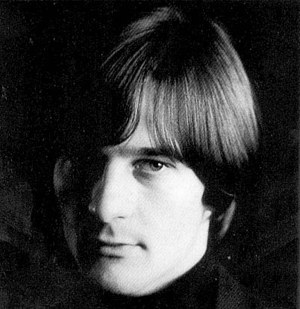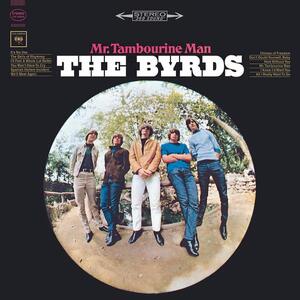Related Research Articles

The Byrds were an American rock band formed in Los Angeles, California, in 1964. The band underwent multiple lineup changes throughout its existence, with frontman Roger McGuinn remaining the sole consistent member. Although their time as one of the most popular groups in the world only lasted for a short period in the mid-1960s, the Byrds are considered by critics to be among the most influential rock acts of their era. Their signature blend of clear harmony singing and McGuinn's jangly 12-string Rickenbacker guitar was "absorbed into the vocabulary of rock" and has continued to be influential.

Another Side of Bob Dylan is the fourth studio album by the American singer and songwriter Bob Dylan, released on August 8, 1964, by Columbia Records.

"Mr. Tambourine Man" is a song written by Bob Dylan, released as the first track of the acoustic side of his March 1965 album Bringing It All Back Home. The song's popularity led to Dylan recording it live many times, and it has been included in multiple compilation albums. It has been translated into other languages and has been used or referenced in television shows, films, and books.

Harold Eugene Clark was an American singer-songwriter and founding member of the folk rock band the Byrds. He was the Byrds' principal songwriter between 1964 and early 1966, writing most of the band's best-known originals from this period, including "I'll Feel a Whole Lot Better", "She Don't Care About Time", "Eight Miles High" and "Set You Free This Time". Although he did not achieve commercial success as a solo artist, Clark was in the vanguard of popular music during much of his career, prefiguring developments in such disparate subgenres as psychedelic rock, baroque pop, newgrass, country rock, and alternative country. He was inducted into the Rock and Roll Hall of Fame in 1991 as a member of the Byrds.
"Chimes of Freedom" is a song written and performed by Bob Dylan and featured on his Tom Wilson produced 1964 album Another Side of Bob Dylan. The song depicts the thoughts and feelings of the singer and his companion as they shelter from a lightning storm under a doorway after sunset. The singer expresses his solidarity with the downtrodden and oppressed, believing that the thunder is tolling in sympathy for them.
"My Back Pages" is a song written by Bob Dylan and included on his 1964 album Another Side of Bob Dylan. It is stylistically similar to his earlier folk protest songs and features Dylan's voice with an acoustic guitar accompaniment. However, its lyrics—in particular the refrain "Ah, but I was so much older then/I'm younger than that now"—have been interpreted as a rejection of Dylan's earlier personal and political idealism, illustrating his growing disillusionment with the 1960s folk protest movement with which he was associated, and his desire to move in a new direction. Although Dylan wrote the song in 1964, he did not perform it live until 1988. However, during his 1978 tour, his band played a brief instrumental version of it as Dylan took the stage.

Mr. Tambourine Man is the debut studio album by the American rock band the Byrds and was released on June 21, 1965, by Columbia Records. The album is characterized by the Byrds' signature sound of Jim McGuinn's 12-string Rickenbacker guitar and the band's complex harmony singing. The material on the album mostly consists of cover versions of folk songs, primarily composed by Bob Dylan, and originals written or co-written by singer Gene Clark. Along with the Dylan-penned single of the same name, Mr. Tambourine Man established the band as an internationally successful act and is widely regarded by critics as representing the first effective American challenge to the chart dominance of the Beatles and other British Invasion bands during the mid-1960s.

Turn! Turn! Turn! is the second studio album by the American rock band the Byrds, released on December 6, 1965, by Columbia Records. Like its predecessor, Mr. Tambourine Man, the album epitomized the folk rock genre and continued the band's successful mix of vocal harmony and jangly twelve-string Rickenbacker guitar. The album's lead single and title track, "Turn! Turn! Turn!", which was adapted by Pete Seeger from text in the Book of Ecclesiastes, had previously been arranged in a chamber-folk style by the Byrd's lead guitarist Jim McGuinn for folk singer Judy Collins' third album, but the arrangement he used for the Byrds' recording of the song utilizes the same folk-rock style as the band's previous hit singles.

The Byrds' Greatest Hits is the first greatest hits album by the American rock band the Byrds and was released in August 1967 on Columbia Records. It is the top-selling album in the Byrds' catalogue and reached number 6 on the Billboard Top LPs chart, but failed to chart in the UK.

The Byrds is a four-CD box set by the American rock band the Byrds. It features music that had previously been released between the mid-1960s and early 1970s, along with a number of previously unreleased tracks and some new recordings from 1990. The box set was issued on October 19, 1990, by Columbia/Legacy and reached number 151 on the Billboard albums chart.

The Byrds Play Dylan is the name of two different compilation albums by the American rock band the Byrds, one released in 1979 and the other issued in 2002. As their titles suggest, each compilation consists of interpretations of Bob Dylan penned songs, which the Byrds recorded at different stages of their career.

"All I Really Want to Do" is a song written by Bob Dylan and featured on his Tom Wilson-produced 1964 album, Another Side of Bob Dylan. It is arguably one of the most popular songs that Dylan wrote in the period immediately after he abandoned topical songwriting. Within a year of its release on Another Side of Bob Dylan, it had also become one of Dylan's most familiar songs to pop and rock audiences, due to hit cover versions by Cher and the Byrds.

"The Times They Are a-Changin'" is a song written by Bob Dylan and released as the title track of his 1964 album of the same name. Dylan wrote the song as a deliberate attempt to create an anthem of change for the time, influenced by Irish and Scottish ballads. Released as a 45-rpm single in Britain in 1965, it reached number 9 on the UK Singles Chart. The song was not released as a single in the US. In 2019 it was certified Silver by BPI.
"It's All Over Now, Baby Blue" is a song written and performed by Bob Dylan and featured on his Bringing It All Back Home album, released on March 22, 1965, by Columbia Records. The song was recorded on January 15, 1965, with Dylan's acoustic guitar and harmonica and William E. Lee's bass guitar the only instrumentation. The lyrics were heavily influenced by Symbolist poetry and bid farewell to the titular "Baby Blue". There has been much speculation about the real life identity of "Baby Blue", with possibilities including Joan Baez, David Blue, Paul Clayton, Dylan's folk music audience, and even Dylan himself.
"It's Alright, Ma " is a song written and performed by American singer-songwriter Bob Dylan and first released on his 1965 album Bringing It All Back Home. It was written in the summer of 1964, first performed live on October 10, 1964, and recorded on January 15, 1965. It is described by Dylan biographer Howard Sounes as a "grim masterpiece".
"You Ain't Goin' Nowhere" is a song written by American musician Bob Dylan in 1967 in Woodstock, New York, during the self-imposed exile from public appearances that followed his July 29, 1966 motorcycle accident. A recording of Dylan performing the song in September 1971 was released on the Bob Dylan's Greatest Hits Vol. II album in November of that year, marking the first official release of the song by its author. Earlier 1967 recordings of the song, performed by Dylan and the Band, were issued on the 1975 album The Basement Tapes and the 2014 album The Bootleg Series Vol. 11: The Basement Tapes Complete.
"The Bells of Rhymney" is a song by the folk singer Pete Seeger, which consists of Seeger's own music accompanying words written by the Welsh poet Idris Davies. Seeger first released a recording of the song on a live album in 1958, but it is the American folk rock band the Byrds' 1965 recording that is the best known version of the song.

Preflyte is a compilation album by the American folk rock band the Byrds and was released in July 1969 on Together Records. The album is a collection of demos recorded by the Byrds at World Pacific Studios in Los Angeles during late 1964, before the band had signed to Columbia Records and become famous. It includes early demo versions of the songs "Here Without You", "You Won't Have to Cry", "I Knew I'd Want You", and "Mr. Tambourine Man", all of which appeared in re-recorded form on the band's 1965 debut album.

"Lay Down Your Weary Tune" is a song written by Bob Dylan in 1963. Dylan originally recorded it for his album The Times They Are a-Changin', but his version of the song was not officially released until 1985 on the Biograph box set. In the album liner notes, Dylan claims that in the song he was trying to capture the feeling of a Scottish ballad he had just heard on a 78 rpm record. The specific ballad Dylan was referring to has not been identified, but speculation includes "The Water Is Wide", "O Waly, Waly" and "I Wish, I Wish".
"Here Without You" is a song written by Gene Clark that was first performed on the Byrds' 1965 debut album Mr. Tambourine Man. It was later covered by other artists, including Reigning Sound and Richard Thompson.
References
- ↑ Trager, Oliver. (2004). Keys to the Rain: The Definitive Bob Dylan Encyclopedia . Billboard Books. ISBN 0-8230-7974-0.
- 1 2 3 Williams, Paul. (1990). Performing Artist: Book One 1960 – 1973. Xanadu Publications Ltd. p. 114. ISBN 1-85480-044-2.
- ↑ Grey, Michael. (2000). Song & Dance Man III: The Art of Bob Dylan. Continuum International Publishing Group. ISBN 0-304-70762-7.
- 1 2 "Spanish harlem Incident review". AllMusic . Retrieved 2010-03-01.
- ↑ Riley, Tim. (1992). Hard Rain: A Dylan Commentary. Knopf/Vintage Books USA. p. 87. ISBN 0-679-74527-0.
- ↑ "Spanish Harlem Incident | The Official Bob Dylan Site". www.bobdylan.com. Retrieved 2024-07-20.
- 1 2 Rogan, Johnny. (1998). The Byrds: Timeless Flight Revisited (2nd ed.). Rogan House. pp. 83–87. ISBN 0-9529540-1-X.
- ↑ "Perfect Day review". AllMusic . Retrieved 2009-10-28.
- ↑ "Chokes! Review". Pitchfork Media . Retrieved 2010-09-23.